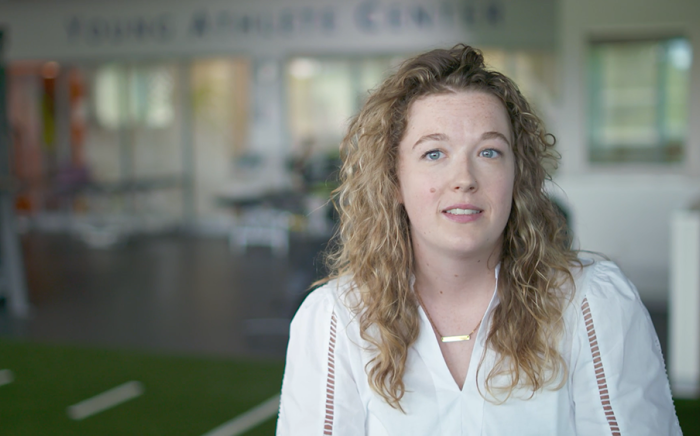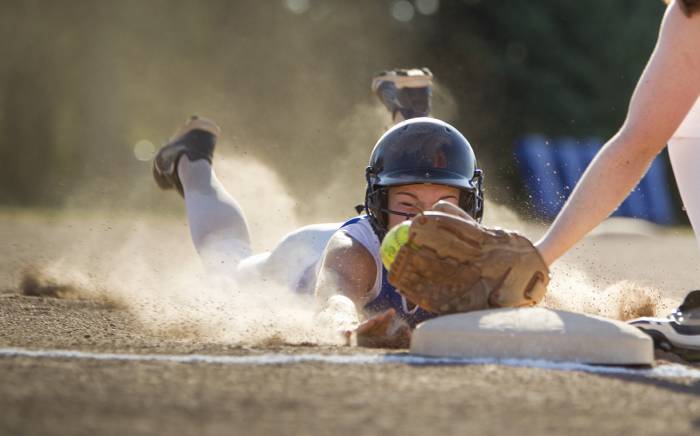by Tom McGowan and Paul Jenkins
The coronavirus pandemic has canceled sporting events, games and practices across the region and around the world — and many young athletes are struggling with ways to stay active and engaged in their sport.
As an athlete and Certified Athletic Trainer, Tom McGowan knows how important sports are to the patients he sees at the Young Athlete Center St. Louis Children’s Hospital. McGowan played soccer throughout college, later coached club and high school soccer, and has worked as an athletic trainer at the high school, college and now youth/club levels.
Here, he offers tips for those in the soccer community — players, parents, coaches and referees — to stay active, and even improve their skills, while they’re away from their teammates and unable to compete:
Players
What can I do while I’m away from my team?
Stay focused on your school work during this time. Even though you’re away from school and it may feel like an extended spring break, you can still improve your intelligence by studying hard and learning something new every day.
How can I train without my coach or teammates?
According to former U.S. Soccer Youth National team coach Shaun Tsakiris, “It’s simple. Players need to spend time on the ball.” This is the time to work on ball and foot skills. Take advantage of this time to develop better control over the ball — for example, dribbling, juggling, passing and striking the ball.
How can I maintain or improve my fitness level?
There are three key elements to fitness for soccer players: endurance, strength and speed/agility.
- Endurance = physical stamina
- Train 2-3 times per week, 20-30 minutes a day.
- Activities such as running, biking or swimming should get the heart rate up to around 75% of the maximum heart rate (220 minus your age)
- Strength
- Train 1-2 times per week, 30 minutes a day.
- Activities should focus on strengthening muscle groups including the core and lower and upper body.
- Technique is more important than the number of repetitions or amount of resistance.
- More information about strength training
- Speed, agility, and plyometrics
- Train 1-2 times per week, 20-30 minutes a day.
- Activities such as cone, ladder and dot drills, and jumping should focus on quick and explosive movements or changing directions.
- Body maintenance
- Proper nutrition, hydration and sleep, coupled with a good injury prevention program, are vital factors for keeping developing athletes healthy and growing.
- A proper warm-up and cool down will help athletes ensure muscle recovery.
- Consult your health care provider if you have any pain during a sport or exercise.
Parents
What can I do for my child during this time?
- Get involved, by filling the role of a coach or teammate:
- Hold your player accountable to continue training and improving their soccer skills or fitness.
- Parents can make sure players aren’t overtraining or doing exercises that are too difficult for the player’s skill level.
- Challenge your child to improve their soccer skills:
- Challenge your player to juggle for 10 minutes. Have them count the number of total juggles they successfully had during those 10 minutes. Then, challenge them to beat that number the next day or the next week.
- Get creative and have fun:
- If you feel like jumping in a training session with your child, see if they can dribble past you, or set up a goal in the backyard and see if they can score on you. This can be a fun way to play and it will create lasting memories with your family members.
Coaches
What can coaches do during this time away from practice and games?
Coaches have a great opportunity to look at improving in two main areas: player and coach development.
- Player development
- Help each individual player on your team identify areas of improvement.
- Examples include ball skills, game strategy and fitness level.
- Send workouts or drills to your team to continue working on their skills. Check in with your players to make sure they are held accountable for their training.
- Modify drills to accommodate at home settings. Some players may not have a big yard to play soccer.
- Try something new like virtual training with a video chat like FaceTime or Zoom.
- Be a positive assurance. This will be the longest some players have gone without playing. Your presence will be a welcome reminder of normalcy.
- Coach development
- Find a weak area of expertise and improve that skillset.
- Rethink practice layout for future practices by adding injury prevention, adjusting drills and practice arrangements, and increasing player development initiatives.
- Expand coaching education and game strategy. Take an online course or expand on your coaching certifications.
- US Soccer and Missouri Youth Soccer Association have great resources for coaches to continue their learning:
www.missourisoccer.org
- Be prepared with a plan of action to return your team to the highest level.
- Remember reconditioning. Players won’t be used to normal training loads so it’s important to gradually return players back to their previous condition over a period of 2-3 weeks.
Referees
What can referees do during this time away from sports?
Just like athletes, referees move for the entire length of the game, which can be 60-90 minutes long. Referee fitness should focus on endurance, strength training, flexibility and injury prevention/maintenance. Referees have time to refresh their minds on the rules, increase their education by taking a course, or even setting out to increase their referee certification to progress onto the next level of play.
Use this time of uncertainty to improve within the game of soccer and in life, while still maintaining a positive outlook. Even though we’re separated through social distancing, we can stay connected and support one another. I challenge everyone to learn something new and improve yourself, connect with one another, with social distancing in mind, and share ideas on how we all can improve during this time.
References
- www.recognizetorecover.org/injury#methods-of-recovery
- www.recognizetorecover.org/nutrition-hydration#the-youth-player
- www.usyouthsoccer.org/coaching-resources
- www.ussoccer.com/referee-program
- www.soccertoday.com/covid-19-cancelled-soccer-practice-former-national-team-coach-tsakiris-on-what-players-can-do
- www.cdc.gov/sleep/about/index.html
- www.nata.org
- www.fifa.com








